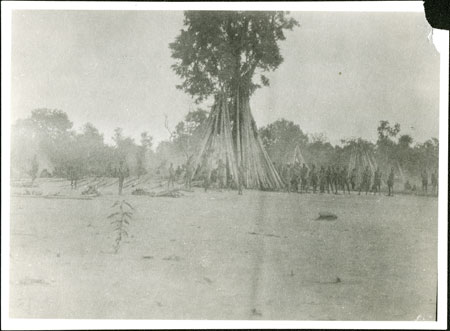Govt. labour in Zandeland

104 x 78 mm | Print gelatin silver
There are records relating to alternative images that we do not have scans for in the database:
1998.341.522.1 - Negative film nitrate , (104 x 78 mm)
1998.341.522.1 - Negative film nitrate , (104 x 78 mm)
Condition:
Fading/ silver sulphide staining overall/ tear upper right corner [EE 1989]
Date of Print:
Unknown
Previous PRM Number:
EP.A.522
Previous Other Number:
47 2 (+93)
Accession Number:
1998.341.522.2
Description:
A view (at some distance) of a stockpile of large bamboo canes, collected by Zande people who look back towards the camera.
Such labour in the 1920s was provided for the administration in lieu of taxes (5 piastres a year) which amounted to 5 days labour a year.
Mostly such labour was directed at road-making activity.
Photographer:
Edward Evan Evans-Pritchard
Date of Photo:
1927 - 1930
Region:
[Southern Sudan] Western Equatoria Yambio
Group:
Zande
PRM Source:
Edward Evan Evans-Pritchard
Acquired:
Donated 1966
Other Owners:
E. E. Evans-Pritchard Collection
Class:
Gathering , Colonial , Plant Use
Keyword:
Plant
Activity:
Administration
Documentation:
Original catalogue lists in Manuscript Collections. Additional material in related documents files. [CM 27/9/2005]
Primary Documentation:
PRM Accession Records - [1966.27.21] G PROFESSOR E.
E.
EVANS-PRITCHARD; INST.
OF SOCIAL ANTHROPOLOGY, 51 BANBURY RD.
OXFORD - S.
SUDAN, AZANDE TRIBE.
Box of negatives in envelopes.
Nos.
1 - 400
Added Accession Book Entry - [In pencil in column] Catalogue room.
[1966.27.23] G PROFESSOR E. E. EVANS-PRITCHARD; INST. OF SOCIAL ANTHROPOLOGY, 51 BANBURY RD. OXFORD - S. SUDAN, AZANDE TRIBE. Box of prints in envelopes, nos. 1 - 400 (prints of negatives in 1966.27.21)
Manual Catalogues [typewritten, entitled "Zande Photographs (E-P)"] - 522. Collecting bamboos in government labour. 47/2 (+93)
Notes on card mount m/s pencil - "Fading SSS overall Tear upper RHS corner 8.89"
Added Accession Book Entry - [In pencil in column] Catalogue room.
[1966.27.23] G PROFESSOR E. E. EVANS-PRITCHARD; INST. OF SOCIAL ANTHROPOLOGY, 51 BANBURY RD. OXFORD - S. SUDAN, AZANDE TRIBE. Box of prints in envelopes, nos. 1 - 400 (prints of negatives in 1966.27.21)
Manual Catalogues [typewritten, entitled "Zande Photographs (E-P)"] - 522. Collecting bamboos in government labour. 47/2 (+93)
Notes on card mount m/s pencil - "Fading SSS overall Tear upper RHS corner 8.89"
Other Information:
In The Zande Scheme (Northwestern University Press, Illinois 1966, page 87) Conrad Reising states that 'when taxes were introduced in the 1920s, many men were not able to pay five piastres (then worth about 25 cents) a year in cash, but worked on the roads for five days in lieu of payment.
The development of a small trade in chilli peppers gradually provided enough money for most men to pay their taxes in cash, and with a boom in the sale of peppers in the early 1930s, poll-tax labour became scarce.'
Recorder:
Christopher Morton 17/11/2003 [Southern Sudan Project]

